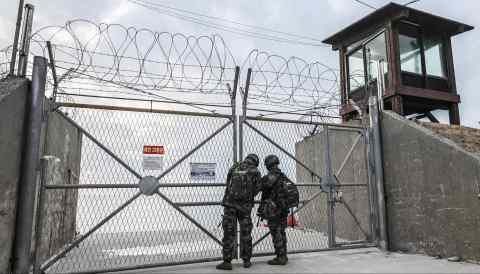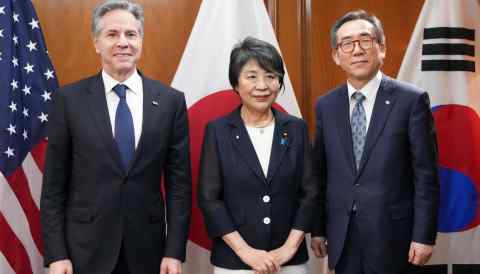
TOKYO (Kyodo) -- Japan is "paying attention" to remarks by the sister of North Korean leader Kim Jong Un suggesting a visit to Pyongyang by Japanese Prime Minister Fumio Kishida could be possible, the top government spokesman said Friday.
At a news conference, Chief Cabinet Secretary Yoshimasa Hayashi declined to elaborate on her statement carried by North Korea's state-run media, citing a possible negative impact on negotiations about the past abductions of Japanese nationals by Pyongyang.
In the statement, Kim Yo Jong said a visit could happen if Tokyo does not make the issue of the abductions an obstacle between the two countries, describing it as "settled." Hayashi said Japan will continue trying to resolve the matter with North Korea.
Hayashi, who doubles as minister in charge of the abduction issue, said Kim sister's assertion regarding the abductions was "totally unacceptable," adding that Japan will also continue to make efforts to solve other problems involving North Korea, such as its nuclear and missile development programs.
In May 2023, Kishida made a sudden commitment to establish high-level negotiations between Japan and North Korea to pave the way for an early summit with Kim Jong Un, although he has not provided details on what kind of official talks he envisions.
North Korea, meanwhile, has used antagonistic rhetoric toward Japan, demanding that Tokyo pay post-World War II compensation. Japan colonized Korea from 1910 through the end of the war in 1945.
But Kim Jong Un sent a message of sympathy to Kishida in early January over a deadly earthquake that hit central Japan on New Year's Day, according to North Korean state media. It is rare for a Japanese prime minister to receive a message from a North Korean leader.
In 2002, Junichiro Koizumi became the first Japanese prime minister to make a trip to Pyongyang, leading to the return of five abductees. He revisited North Korea in 2004.
Japan and North Korea have no diplomatic relations, but Koizumi signed the historic Pyongyang Declaration with the late leader Kim Jong Il, father of Kim Jong Un, on Sept. 17, 2002.







